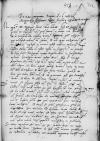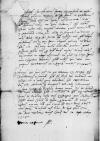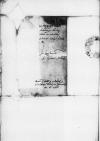Post tot fatigas, [dili]gentias et impensas nostras, quas fecimus in ⌊ducatu nostro Barensi⌋ et in recuperanda eiusdem ducatus possessione, quam adhuc quoad castrum audimus non habere, et nunc iterum intelleximus, quod, ut crederemus nequaquam in animum nostrum inducere possumus, tamquam ⌊caesarea maiestas⌋ oblita et iustitiae nostrae, et sanguinis, et pietatis, et litterarum suarum privilegiorum, et tot confirmationum, et investiturarum nostrarum, contulisset ducatum nostrum Barensem illustri domino ⌊vice regi Neapolitano⌋ cum omnibus aliis bonis nostris ibidem consistentibus, et nobis aliqua alia bona respectu praedicti ducatus nostri in recambium dare decrevisset, et talis hic fama venit. Quod si ita foret, hoc etiam
Strenuitas Tua ibi non ignoraret, nisi hoc secretissime facerent. Et tamen ibi Strenuitas Tua nostris et suis non caret amicis, et maxime illustris dominus ⌊comes de Nasav⌋ ac ⌊magnus cancellarius⌋. Illos no[s] credimus veros amicos nostros, qui hoc dixissent Strenuitati Tuae. Nam [uter]que eorum est vir iustus et rectus, plus amans et sequens iustitiam et aequi[tatem] quam favores. Nec etiam hoc diu occultari potuisset nos ... ab eo caesareo nuntio , quem exspectamus huc venturum ... latius intelligemus. Et tamen si quid persenserit Strenuitas T[ua], diligentissime hoc denuntiare non desinat domino ⌊comiti de Nasav⌋ et aliis amicis nostris et instare apud ⌊caesaream maiestatem⌋, ut memor iam concessionis suae non permittat sic evidentissimam nobis inferri iniuriam toti Christianitati manifestam et publicam.
Si tamen cognoscat Strenuitas Tua, quod haec fabula foret et vaga ac incerta fama, extunc de his coram nemine pandat, ne videamur nos debilem aut mutabilem reputare causam nostram, [quam ce]nsemus esse non minus fortem et constantem, ut iustam. [Vel]lemus quam primum certiorari de ista fama et exspectamus [a]liquas litteras Strenuitatis Tuae, quibus nos certioraret. Certe non possumus induci, ut huic credamus, nisi ⌊maiestas caesarea⌋ vellet talem iniustitiam admittere, qualis nemini alteri in Christianitate illata fuerit, oblita et sanguinis et amicitiae nobis debitae, et quod hoc faceret sine consensu nostro, quem numquam praestabimus nec in eam aliquid polliceri valeat Strenuitas Tua. Nos enim nullum recambium putamus, quod sufficere possit nobis pro his bonis nostris totiens nobis confirmatis et assecuratis. Et quid in aliis sperare aut exspectare debeamus, quando nobis haec vera et propria heredit{ari}as ita indignis modis eriperetur?
Habuimus hic ⌊fratrem⌋ Strenuitatis Tuae, qui redierat ex ⌊Neapoli⌋. ⌊Quem⌋ commendavimus in servitorem reverendo patri domino ⌊episcopo Cracoviensi⌋ et suscepit eum a nobis grate commendatum, hic exspectabit Strenuitatem Tuam. Noluimus, quod divagaretur, sed ibidem asservaretur [in] bona virtute et disciplina bonorum morum. Nos hic habentes ...a omnium amicorum, quando Dominatio Vestra curam ibi habet rerum nostrarum hic de suis non cogitet.
[Ne]scimus, si sabellini nostri, tres quadragenae, quos misimus illustri domino ⌊comiti de Nasav⌋, pervenerunt ad manus vestras una cum litteris, quae erant sub dato mensis Februarii anni praesentis. Certificare nos debet de his Strenuitas Tua. Et bene valeat.


